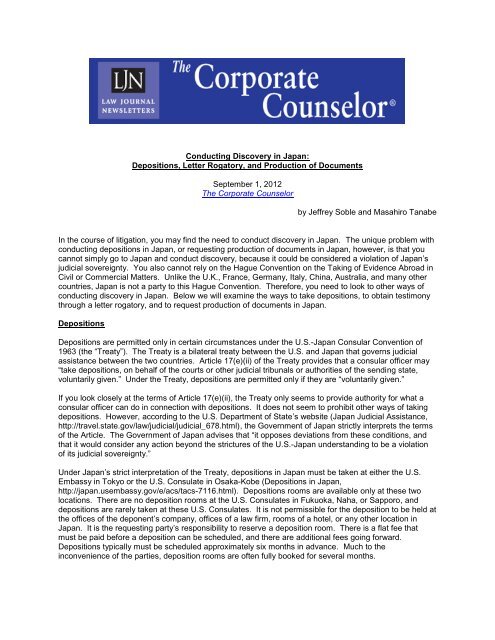Exploring the Historical Background of Letters Rogatory in Legal Frameworks
Exploring the Historical Background of Letters Rogatory in Legal Frameworks
Blog Article
Letters Rogatory Explained: Facilitating Legal Cooperation Between Countries

Definition of Letters Rogatory
Letters rogatory are formal demands made by a court in one jurisdiction to a court in one more territory, looking for support in acquiring proof or testimony for a lawful case. This step-by-step mechanism is crucial in the context of international legislation, where lawful systems might differ, and cross-border teamwork is essential. Letters rogatory help with the event of details that may be important for settling instances, especially in instances including intricate global issues.
Normally, these demands arise in civil, criminal, or administrative issues where a celebration requires evidence that lies outside the jurisdiction of the requesting court. The letters offer as a method to make certain that the concepts of due procedure are upheld, enabling courts to gain access to evidence that may otherwise stay unattainable as a result of lawful or geographical obstacles.
Making use of letters rogatory is controlled by global treaties, reciprocal arrangements, or residential legislations, which define the treatments and responsibilities of the courts included. It is necessary to keep in mind that the implementation of such demands is not ensured; they depend upon the legislations and practices of the jurisdiction receiving the letter. Hence, letters rogatory are a pivotal device for cultivating lawful teamwork and making sure justice across borders.
The Process of Issuing Letters Rogatory
Issuing letters rogatory involves an organized process that ensures conformity with both residential and worldwide lawful requirements. The asking for party, usually a court or legal authority, prepares an official demand detailing the nature of the assistance looked for, the proof or info needed, and the lawful basis for the request. This record needs to be accurate to facilitate understanding by the international jurisdiction.

The next step involves transmitting the letters rogatory to the marked international authority. This is usually done via polite networks or worldwide legal assistance structures, making certain that the demand is gotten and acknowledged by the international court. The international court after that processes the request according to its very own lawful procedures, ultimately replying to the asking for celebration with the popular information or proof, therefore helping with international legal collaboration.
Significance in International Law
The value of letters rogatory in worldwide legislation can not be overstated, as they function as an important device for judicial collaboration across boundaries. These formal demands for help in legal issues enable courts in one territory to inquire, proof, or the presence of witnesses from an additional jurisdiction, therefore assisting in the administration of justice in global situations.
Letters rogatory are specifically essential in the context of globalization, where lawful conflicts often extend multiple nations. They enable the collection of proof that might otherwise be hard to reach, making sure that lawful procedures are educated and fair. By cultivating partnership his response between judicial systems, letters rogatory aid support the rule of legislation and promote shared respect among countries.
Additionally, using letters rogatory demonstrates a dedication to international norms and concepts of cooperation, showing the interconnected nature of modern legal methods. It highlights the significance of sticking to established procedures and treaties, such as the Hague Convention, which gives a structure for these requests - Letters rogatory. Eventually, letters rogatory boost the efficacy of legal processes, making certain that justice is not hindered by geographical limits
Difficulties and Limitations
Despite their relevance, letters rogatory face several difficulties and limitations that can hinder their effectiveness. One key issue is the differing lawful frameworks and procedures across territories, which can cause misconceptions and hold-ups in the implementation of requests. Various nations might have distinctive needs for the validity of letters rogatory, complicating the process further.
In addition, the frequently drawn-out nature of worldwide legal teamwork can impede prompt access to evidence or witnesses. This delay may adversely impact lawful process or recurring examinations, specifically in situations needing urgent action. browse this site The absence of resources and training in some jurisdictions can result in insufficient handling of demands, leading to my company inadequate or insufficient actions.
Nations with much less formal legal systems might struggle to conform with the step-by-step roughness expected in letters rogatory. These difficulties demand continuous dialogue and reform to improve the efficiency of letters rogatory in legal collaboration.
Study and Examples

On the other hand, obstacles can occur, as seen in an instance involving a European country looking for proof in an ongoing criminal matter from a non-EU country - Letters rogatory. The procedure was delayed because of bureaucratic obstacles and varying lawful standards, eventually preventing the examination
These examples show that while letters rogatory can promote international collaboration and quicken legal proceedings, they likewise highlight the demand for clear communication and understanding of lawful structures in between countries. Such situation researches emphasize the importance of refining this tool to boost efficiency and effectiveness in worldwide lawful issues.
Verdict
In recap, letters rogatory work as a crucial device for promoting lawful cooperation in between nations, ensuring the collection of evidence and statement across jurisdictions. Their importance in international legislation can not be overstated, as they advertise due process and boost the effectiveness of cross-border lawful proceedings. Nonetheless, challenges such as varying lawful structures and political stress might prevent their performance. Proceeded efforts to enhance the process and improve are crucial for cultivating stronger international judicial cooperation.
Letters rogatory are official requests made by a court in one territory to a court in one more territory, seeking assistance in getting evidence or testimony for a lawful proceeding. The asking for party, commonly a court or lawful authority, drafts an official request outlining the nature of the assistance looked for, the proof or info required, and the lawful basis for the request. The foreign court after that refines the demand according to its own legal procedures, eventually reacting to the asking for event with the sought-after information or evidence, thus facilitating international legal collaboration.
In addition, the usage of letters rogatory demonstrates a commitment to worldwide standards and principles of teamwork, reflecting the interconnected nature of contemporary lawful practices.Worldwide lawful cooperation with letters rogatory is not without its real-world effects, as illustrated by different instance researches that highlight both difficulties and successes.
Report this page